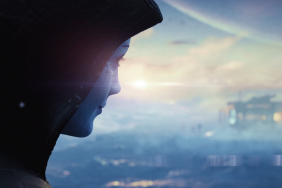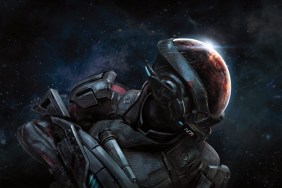In light of the recent comments made by Dyad creator Shawn McGrath, Daily Reaction discusses the futility of story in video games. Sebastian Moss and Dan Oravasaari talk about the true need for stories in games, and if we are seeing an evolution in storytelling or a waste of time.
Dan: Developers are interesting people – they are incredibly intelligent, yet with that intellect it is possible for them to say something that can seem fairly single minded. In an interview with Dork Shelf, the developer of the PSN game Dyad, Shawn McGrath, said:
I think linear story and interactive anything are completely diametrically opposed. They make no sense together at all, and any attempt to put storylines in games, in any traditional sense, is completely idiotic.
A statement that he later followed up with by discussing how pointless they hype surrounding Mass Effect’s tale was, and the false nature of its dynamic story. He goes on by saying that the reality behind the title is that the paths you choose do not, in fact, give you control over the story, but are instead a set number of paths that are designed by programmers. This in itself is a way to show that the story in games is more of a controlled experience, and not really a unique story for the user.
In Mass Effect, you make a couple of choices and some little things change, but they’re pretty meaningless and don’t matter. Some of them are like, “oh, this guy died.” And you’re like, “Aw.” But it’s pretty inconsequential. The Reapers are coming, the bad stuff’s happening, it doesn’t matter. That hasn’t changed. You cannot change that in Mass Effect.
Also, he discusses the fact that the story in Mass Effect was sub-par even in terms of the sci-fi genre.
Seb: Ok, here’s my problem: He wants people’s actions in Mass Effect to change the entire universe, rather than just the lives of a few people. You can’t. You know where your actions are also mostly meaningless and only affect the lives of a few people? Real life.
Rather than saying games with choices should allow you to have an almost godlike control over the universe, we should have games where the small effect you have on the people around you is more meaningful. If someone close to you is hurt, you’ll be devastated. If Shepard’s mum gets space flu, you don’t give a damn. That doesn’t mean stories and interactivity can’t go together, it just means that it hasn’t been done right. Mass Effect has a decent-ish story, I wouldn’t trash it as much as he did, but it could certainly be better (especially at the end).
When I look at a game like Heavy Rain I see that step in the right direction. The acting was still a bit hammy, the plot far from perfect, but the choices felt like they mattered to you. If you kissed ___ or shot ___, the world still turned, the rain still fell, but the people around you were changed, were hurt or helped. It’s a start.
Of course, you’re still always going down predetermined pathways created by a developer, but that’s not necessarily a bad thing. McGrath wants games to only be ones where you create the story, rather than a mix of the two. Just like with poetry, sometimes the meaning is meant to be discussed, you’re meant to have your own interpretation, but other times it is clear, the writer wants you to see his thoughts. Both are fine.

Dan: While it is true that there is a place in the games industry for titles much like Dyad, the idea that every story should be developed internally by the player, instead of a guided experience, seems to be missing the nature of storytelling. Dyad is, in most aspects a good game, but when we look at its ability to take you through an event, it is a giant stretch to even try and go down that road. Games like Journey are the best example of how to tell a narrative that is not constructed solely by a developer, but by its ability to interact with people that tells the true tale. Yet, the same could also be said about playing an online shooter like Call of Duty, where we are joined in by a unique group of people, who go on a journey together, and a unique story unfolds, but is one that no one cares about. These are the limits of creating a story that is centered around a person’s dynamic experience, because we rely on what we can derive from the gameplay, or we are simply at the mercy of the troglodytes on the internet.
Shawn McGrath does have a point that most of the experiences we get in video games are limited by design, therefore the concept of giving control to a player is pointless, as the control is more of an illusion – thus defeating the point of it being in a dynamic medium like video games. This is a good point, but the idea that having any story in games is “idiotic” seems to believe that we cannot ever move in a direction where we could get better at creating an experience that matters, and that seems extremely shortsighted.
Seb: I don’t know about you, but when I play multiplayer games like CoD, I construct backstories for my character and the people I kill.
The interactivity of games does seem opposed to a linear story. You can feel that, because you’re playing a character, you should be able to do what you want. That’s fine for some games, sure, but sometimes I do want to be told a story. I want to learn about that character. Uncharted is incredibly linear, its story is far from original, but it’s still engrossing, still enjoyable and certainly a game that should have been made.
McGrath didn’t go on to mention this, but one big issue with all large story-based games is that they suffer from the fact that the story has to be shoved in between gameplay. Most of the time, players are focused on killing the enemy, not on hearing about why they’re killing the enemy. Cutscenes are often used in games, and they can be a good way of telling a story, but they’re basically just mini-movies jammed in there. The aim should be to move away from that reliance on another medium, to make us never leave the immersive gameplaying experience. Half-Life did that, to a limited extent. It realized that cutscenes break up the flow of gameplay, rip you out of that world and bring you into the passive one of film.
Game stories are far, far from perfect. They’re held back by the too many chefs problem, they’re held back by the fact that gameplay has to be the priority, that people who are focused on running away from a monster can’t listen to the plot, that the player controls the character so devs can’t be sure if s/he sees what they want. Those are limitations, but that doesn’t mean that the entire idea of linear story-based games is flawed. The problems can, and will, be overcome.
The future of story-based games is bright, as long as we embrace them, rather than ostracizing them.
If you agree with Daily Reaction Press X, if you don’t Press O, if you don’t want to have a limited y/n choice set, turn off your console. Also, follow Seb and Dan on Twitter because nothing is linear about their conversations, and email us to affect the universe massively.
Be sure to email DR ideas, podcast comments and your dark secrets to DailyReaction@PlayStationLifeStyle.net.








